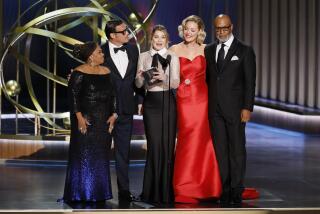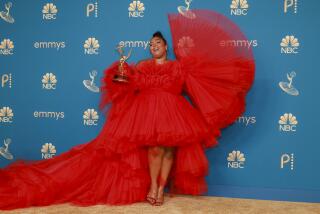‘Hatfields & McCoys’ feud became love fest at History
- Share via
They kept telling him no one would watch it. It would skew too old, women wouldn’t be interested, people didn’t care about history, it didn’t have foreign appeal, there were too many characters, the story was too convoluted.
For nearly three decades, producer Leslie Greif heard this from showbiz executives all over town while he doggedly pitched his project about the legendary blood feud between two Civil War-era Appalachian families. And then it aired and made cable ratings history and went on to pull in 16 Emmy nominations, the most in the network’s history.
“Hatfields & McCoys,” a six-hour miniseries, aired Memorial Day weekend on History, averaging nearly 14 million viewers over each of three nights, which set the record as the second-most watched program ever on ad-supported cable (the first was the Disney Channel movie “High School Musical 2,” in 2007).
PHOTOS: Emmy nominations 2012 - Top nominees
“With the ratings and acceptance and recognition of our peers, this is a dream come true,” Greif said the morning nominations were announced. “I knew it was a great story about the senselessness of violence and what we do for honor. It’s timeless and universal,” he had said in an earlier interview.
It helped that Kevin Costner came aboard to produce and lead a cast of 85 speaking parts. But what really made the difference, said Greif, was one person: History network President Nancy Dubuc, who was determined to introduce scripted original programming to the network.
“Our strategy was to look at big, presold titles with name recognition,” said Dubuc. She saw the conflict-driven, escalating story of the real-life decades-long hillbilly feud as something Americans would both recognize and want to know more about.
Clearly, her instincts paid off. For Greif, the success of “Hatfields” proves that too many decision-makers are hobbled by research and statistics. “They’re all trying to anticipate what the audience wants, instead of going with their gut instincts. Nancy didn’t listen to the no’s. She just said, ‘We’re going to make this.’”
More to Read
From the Oscars to the Emmys.
Get the Envelope newsletter for exclusive awards season coverage, behind-the-scenes stories from the Envelope podcast and columnist Glenn Whipp’s must-read analysis.
You may occasionally receive promotional content from the Los Angeles Times.










